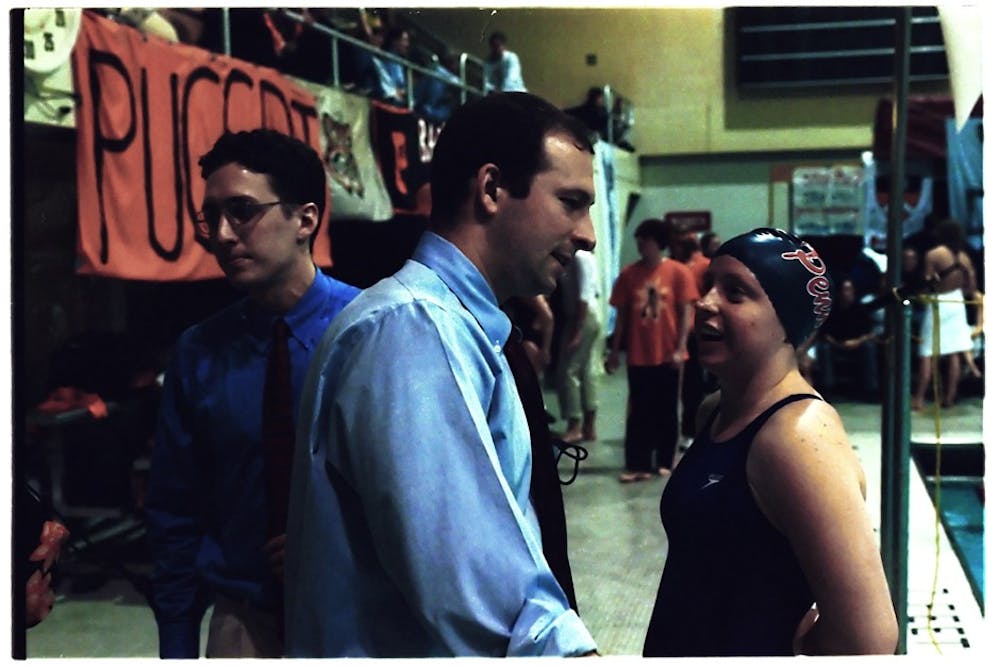It turns out that one is greater than two.
At least that’s the case in three Penn sports, where one coach is responsible for the success of not just one, but two teams.
The men’s and women’s fencing, squash and swimming programs are overseen by three head coaches who each balance the training, practices and competitions of both teams.
“It’s kind of nice,” swimming coach Mike Schnur said optimistically, “because it gives you two opportunities to succeed.”
“I like having two teams rather than one,” fencing coach Andy Ma echoed. “It gives you double rewards if you win.”
But in addition to just sheer probability, the dual-coaching role has tangible benefits for the three programs, most noticeably in recruiting.
“We see the advantage of scale economies in recruiting,” Senior Associate Director of Athletics Alanna Shanahan wrote in an e-mail. “One coach can scout a meet or tournament where recruits from both genders are competing. This allows us to expand our scope of recruiting, which is critical to the success of programs at the collegiate level.”
Just this year, squash coach Jack Wyant and his two assistant coaches have traveled in the United States, Canada and United Kingdom and attended three or four tournaments to recruit — none of which would have been possible with two separate head coaches.
A second advantage — especially for the female athletes — is that the two teams can practice together.
Schnur runs practice based on speed, not gender, with swimmers who have similar capabilities working together.
He said the greatest advantage for him is that the women are able to practice at a much higher level than if they were separated from the men.
“I don’t look at it as coaching two teams,” he said. “I look at it as coaching athletes. It doesn’t matter what their gender is. You’re just coaching athletes, people who want to swim.”
For that matter, the men benefit from their added competition as well.
Ma splits his fencers up based on the weapon used, allowing the women to practice with the men, who are generally quicker, he said.
While the squash teams practice separately, Wyant emphasized that the rules and lessons are consistent for all his players.
“I try to treat both teams the same,” he said. “My rules are pretty simple. Show up on time, work hard and have fun.”
While this system of shared coaches could appear disadvantageous, it turns out that the best teams nationally and in the Ivy League in each of these sports use a singular coaching structure.
At Penn, a single coach for fencing and swimming is tradition.
“In fencing, we have had a history of success with this model since the inception of our program,” Shanahan said.
Penn’s swim teams have had a combined coach since 1982, Schnur said. Currently, half of the Ivy League teams have a single coach system, which is the norm at the most competitive level of collegiate swimming. However, the top two programs in the Ivy League — Princeton and Harvard — each have separate men’s and women’s coaches.
“When you look at the top 10 programs in the country, very few of them are separate coaches,” Schnur said.
While a single squash coach is new at Penn, the idea gained popularity in the Ivy League in the mid-1990s when Harvard had great success with the structure.
Wyant spent six years as coach of the women’s team. When the men’s coach, Craig Thorpe-Clark, resigned last summer, Wyant approached the athletic department with the idea of becoming the sole coach for both teams.
“In squash, the majority of Ivy teams have one head coach for the program,” Shanahan said. “Given coach Wyant’s success with the women’s program, we feel confident in his leadership of the program.”
Halfway through his first season, the jury is still out — the men’s team sits at No. 10 in the national rankings, a spot below their finish last year, and in roughly the same position in the Ivy standings.
But if his success with the women is any indicator, the best is yet to come. In Wyant’s first year at Penn, the women finished fifth in the Ivy League with a 2-4 record. Since then, the program has amassed a winning record each year, and an Ivy League championship in 2008.
This season, he’s shooting for two.



